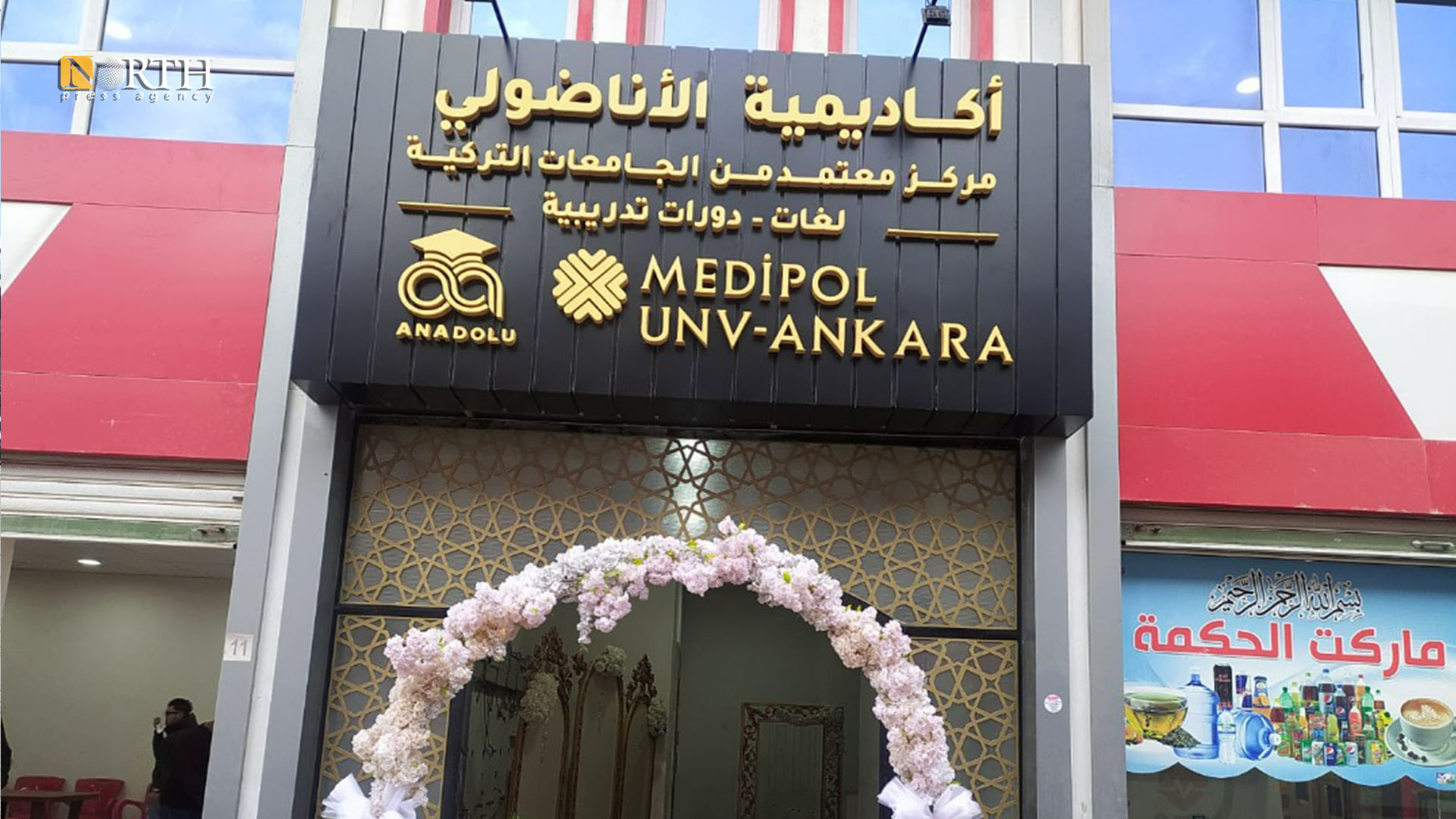IDLIB, Syria (North Press) – University students and those working in education sector in areas held by Turkey and Syrian factions affiliated with it, in the northern countryside of Aleppo, say Turkey is escalating its policy of Turkifying sectors of education and culture in the region to fulfill its goals in strengthening its influence and impose its language and historical Ottoman era.
Turkey is conducting quick steps in Turkifying the education in light of the stable military frontlines and reaching no political solution for the war that contributed to help it in seizing vast swathes of the Syrian territory.
All education institutions from primary to post-secondary levels are completely affiliated with Turkey, according to a worker in education sector in Azaz city, north Syria.
This is carried out through the Turkish supervision, check-cashing, and all administrative issues that are directly affiliated with Turkish states, he told North Press under the condition of anonymity.
Imposing Turkish curriculum and language and running the educational institutions are all means of achieving and entering political goals to children and teenagers’ mind, according to him.
Last week, Turkish officials opened the first institution in Azaz city, northern Aleppo countryside. The institution “Anadolu Turkish Academy” is one of the policies adopted by Turkey to continue the ‘Turkification’ process in the territories it control in northwest Syria.
The opening of the Anadolu Academy coincided the anniversary of the Arabic Language Day.
The Anadolu Academy will start work in the city and open the door for registration for studies, which will have many departments of different specializations, especially in the medical sector, a private source told North Press.
Systematic policy for education
The Turkish intervention in schools and university collages is a systematic policy for education sector, Mouna Saghir, a pseudonym for a university student of Arabic Department at Free Aleppo University in Azaz city that is run by the Turkish-backed Interim Government, said.
Imposing the Turkish language in all levels of school and universities in the opposition-held areas is the simplest aspect of this policy, according to Saghir.
If Turkey was really concerned about interests of residents of areas it runs in Syria, it would have adopted the universities, which are already open, of its supporters and helped them to obtain international recognition from academic and scientific bodies.
Several centers for teaching Turkish language and libraries have been established in Azaz city. The Gaziantep University includes three faculties in the Syrian interior, including the Faculty of Education in Afrin, and Faculty of Sharia Sciences in Azaz and the Faculty of Economic Sciences in al-Bab.
Turkey seeks to impose its own culture to facilitate the operation of strengthening influence in Syria. Thus, imposing the de facto policy in northwest Syria in cooperation with Syrian armed opposition factions.
Since controlling Afrin and its environs in March 2018, Turkey has imposed Turkish language in the educational curricula at all levels as part of Turkey’s policy of Turkification and demographic change.
Turkey entered northern Syria claiming to protect its security and fight terrorism, while the truth is that it wants to annex these lands.
But it, in turn, displaced people, looted heritages and land resources, changed names of villages and squares, imposed the Turkish lira in dealing, and Turkified the Syrian north under the pretext of its national security and fighting terrorism.
Activists and observers argue that Turkey is paving the way, through education and other means, for expansionist plans similar to the scenario of The Sanjak of Alexandretta, which was taken by Turkey in 1936.
According to activists and observers, Turkey is strengthening its policy of Turkification, to give the civil and cultural sectors a Turkish character with the aim of annex these areas to it. This, of course, contradicts the official Turkish statements that keep talking about the unity and integrity of the Syrian territories.
Since early in 2017/2018, the Turkish language has become compulsory in schools, in addition to changing the textbooks and teaching some materials in the Turkish language.
The Turkish language is a main subject that is factored into the overall success rate for all classes.
Turkey has opened nine universities in northwestern Syria, including: Aleppo University, Idlib University, Mari University in Saraqib, Shimal Private University, in Sarmada, International University for Science and Renaissance, Sham International University, in Azaz, and others.
Culture taught to generations
In late February, Turkish officials opened a cultural center in the city of Jarablus, in the eastern countryside of Aleppo, north Syria.
On February 5, the Higher Institute of Health Sciences and the Faculty of Medicine was found in al-Ra’i town, north Aleppo, by a decree issued by the Turkish President, Recep Tayyip Erdogan.
“Such a step is considered a flagrant violation of international law and the United Nations Charter,” the Advisor of the Syrian National Reconciliation, Salim al-Kharrat previously said.
Through education and media, Turkey tries to export its thoughts all over the world and has a clear concern to revive and teach its history during the era of the Ottomans 400 years ago, Anear al-Khalaf, a pseudonym for a teacher in Azaz city, said.
These practices are included within the terms of Turkifying the areas that are seized by Turkey and the Syrian factions in the countryside of Aleppo.
If the policy of Turkifying education continues over years, this will allow Turkey to impose its language and culture in the opposition-held areas, “moreover, it will do more in case it includes information that it wants in the curriculum and teaches it to generations over years,” the teacher added.
He stressed that imposing the Turkish language and culture in the university and high education will produce qualified and educated people, whom Turkey will exploit in fulfilling its goals.

